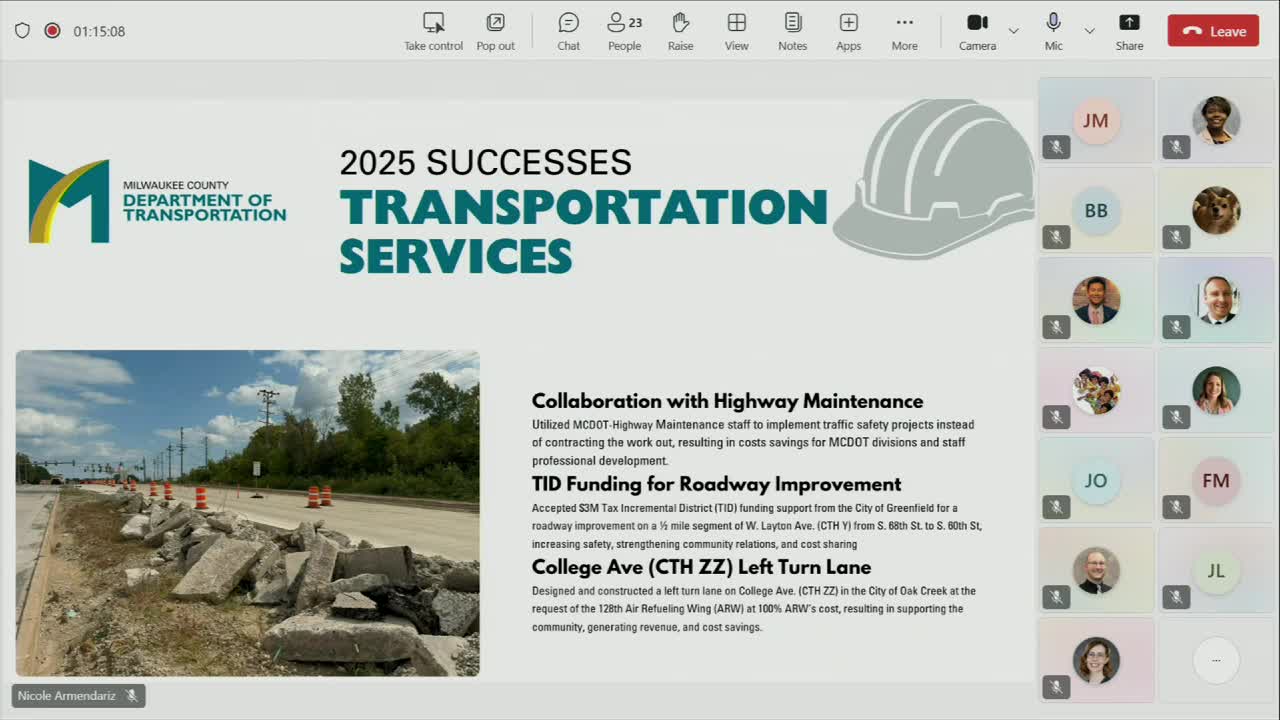Milwaukee County transit officials warn of multimillion-dollar shortfall; 15% service cuts and fare increase proposed
Get AI-powered insights, summaries, and transcripts
Subscribe
Summary
Milwaukee County Transit System officials told the County Board Finance Committee they face a projected $9.2 million 2025 shortfall and proposed a 15% cut in service, elimination or modification of several routes, a $0.75 adult fare increase and sunsetting a same-day paratransit pilot to help close the gap.
Milwaukee County Transit System President and CEO Steve Fuentes and MCTS staff told the County Board Committee on Finance that MCTS faces a material budget shortfall and has proposed a package of service reductions, fare changes and a pilot security program to help close the gap.
The agency projects it will exhaust remaining federal COVID relief funds and end 2025 with a projected $9.2 million deficit (reduced from an earlier $10.9 million projection), Fuentes said. To address the shortfall in the 2026 recommended budget, MCTS proposed reducing overall service by about 15 percent, eliminating six low‑ridership routes, modifying five other routes, adjusting frequencies on 22 routes and raising the adult cash fare from $2.00 to $2.75.
Why it matters: The proposed changes would concentrate service on higher‑frequency corridors that carry most riders but would remove or reduce service on routes used for jobs, medical trips and other day‑to‑day travel by transit‑dependent residents. County supervisors, transit operators and riders urged more detail and mitigation options during the hearing.
MCTS and county officials described the fiscal picture and the measures under consideration. Fuentes said federal COVID relief provided substantial one‑time support but that those funds are ending: “we are projected to utilize the final 8,500,000 of federal covid funds due the projected deficit for this year,” he said. Interim DOT Director John Rogers characterized the governance lapse that allowed the budget gap to grow as a communication failure: “this is a clear failure. Failure of in process and communication,” he said, calling for urgency and transparency going forward.
What’s in the proposal - Service reductions: MCTS staff proposed a roughly 15% reduction in service hours. The agency identified six routes for elimination (listed in MCTS materials as routes 20, 28, 33, 34, 55 and 58) and five routes for modification (including the 11, 22, 24, 80 and 88), and frequency reductions on 22 routes on weekdays and additional adjustments on weekend schedules. - Fare change: The proposal raises the adult cash fare by $0.75 (from $2.00 to $2.75). MCTS estimates that change could generate roughly $4.3 million in additional revenue. - Paratransit: MCTS plans to end the same‑day Transit Plus pilot early in 2026 because the pilot would require an additional $1.9 million to continue for a full year; staff said continuing it would force deeper service cuts elsewhere. - Security pilot: MCTS proposed a pilot deploying volunteer Milwaukee County sheriff’s deputies to targeted routes to supplement MCTS public safety staff. County staff estimated the sheriff pilot at up to $300,000 (overtime, voluntary participation), funded by a revenue source incorporated into MCTS’s budget.
Officials stressed tradeoffs and contingency planning. Jesus Ochoa, MCTS director of service development, said planners prioritized retaining high‑frequency corridors that move about 73% of annual riders and that MCTS will monitor loads after changes are implemented and add service where crush loads emerge. “We can make the changes 4 times per year… but we can put extra service out there” if necessary, Ochoa said.
Paratransit and vendor performance MCTS staff said paratransit (Transit Plus) and same‑day pilot funding decisions were among the toughest. MCTS told the committee the same‑day pilot will be sun‑setted unless new revenue is found. The agency also reported ongoing problems with its contracted paratransit operator (Transdev). Fuentes and other officials said they are pursuing contractual and operational remedies and monitoring performance closely.
Union and community reaction ATU Local vice president Michael Brown, representing transit operators, told the committee the union opposes the route cuts and warned that removing some routes will displace riders who depend on routes for work. “The 28, specifically … those are job routes,” Brown said. Supervisors echoed concerns about riders who rely on affected service, citing letters and town‑hall feedback from constituents and advocates for seniors and people with disabilities.
Governance and next steps Committee members pressed MCTS and the Department of Transportation on why the budget shortfall was not disclosed to the board earlier. Interim DOT Director John Rogers called the lapse “a clear failure” of process and emphasized corrective steps; Fuentes pledged transparency under new MCTS leadership: “MCTS is going in a new direction and we are ready. We’re there. We’re moving in the right direction,” he said.
MCTS officials said the 2026 proposal is a reactive plan to stabilize finances; staff said they will refine changes, publish district‑level impacts for supervisors after final budget action, and monitor ridership to restore or add service if ridership and revenues allow. Several supervisors asked MCTS to provide route‑by‑route ridership, demographic impact data and cost estimates for restoring specific routes or programs.
Speakers and sources quoted in this article are identified in the article’s speaker list. The committee did not take a final vote on MCTS’s plan during the session; the presentation was part of the 2026 budget review process.
